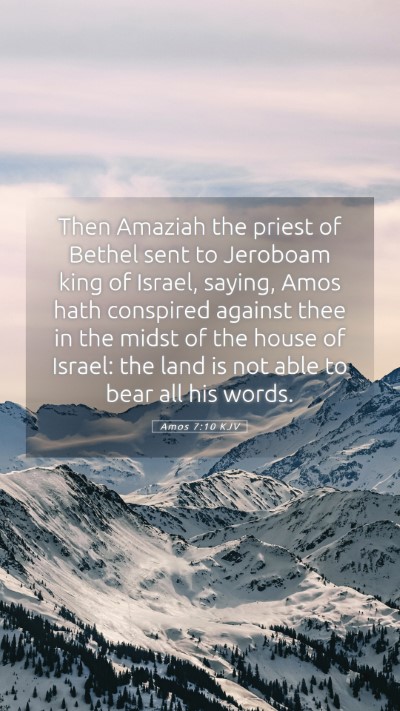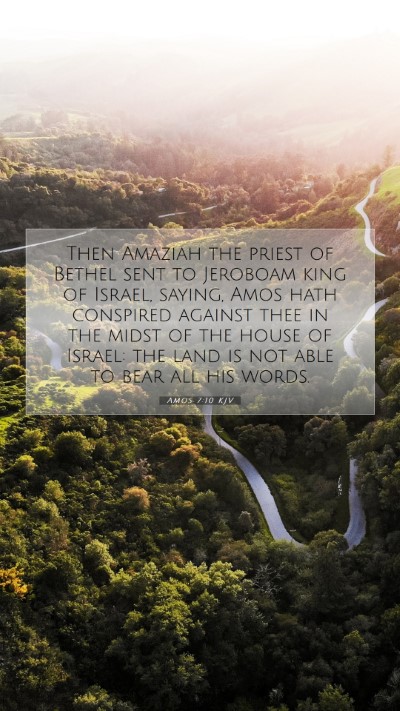Old Testament
Genesis Exodus Leviticus Numbers Deuteronomy Joshua Judges Ruth 1 Samuel 2 Samuel 1 Kings 2 Kings 1 Chronicles 2 Chronicles Ezra Nehemiah Esther Job Psalms Proverbs Ecclesiastes Song of Solomon Isaiah Jeremiah Lamentations Ezekiel Daniel Hosea Joel Amos Obadiah Jonah Micah Nahum Habakkuk Zephaniah Haggai Zechariah MalachiAmos 7:10 Meaning
What is the meaning of Amos 7:10?
Then Amaziah the priest of Bethel sent to Jeroboam king of Israel, saying, Amos hath conspired against thee in the midst of the house of Israel: the land is not able to bear all his words.
Amos 7:10 Bible Verse Meaning
Understanding Amos 7:10 - A Comprehensive Bible Verse Commentary
The verse Amos 7:10 reads: "Then Amaziah the priest of Bethel sent to Jeroboam king of Israel, saying, Amos hath conspired against thee in the midst of the house of Israel: the land is not able to bear all his words." This passage contains significant insights regarding the prophetic ministry of Amos and how it was perceived by the religious and political leaders of the time.
Contextual Background
Amos, a shepherd and a fig farmer from Tekoa, was called by God to prophesy against the northern kingdom of Israel during a time of peace and prosperity. However, this prosperity was accompanied by rampant corruption, social injustice, and idolatry. The context of Amos 7:10 is crucial for understanding the prophetic warning he represents and the resistance he faces from the established religious authorities.
Verse Breakdown and Commentary
-
Amaziah's Response:
Amaziah, the priest at Bethel, represents the religious establishment that was threatened by Amos's prophetic message. Public domain commentaries such as those by Matthew Henry indicate that Amaziah's report to Jeroboam demonstrates a desire to protect the status quo and his own position. He falsely accuses Amos of conspiratorial intentions, attempting to undermine the true prophetic voice in favor of a corrupt system.
-
The King’s Involvement:
By alerting Jeroboam to Amos's prophecies, Amaziah seeks to provoke a reaction from secular power against the prophet. Albert Barnes comments on how this interaction highlights the tension between prophetic truth and political authority. Amos's words were seen as a challenge not only to the monarchy but to the very fabric of societal norms that had become entrenched in Israel.
-
The Weight of Amos's Words:
The phrase “the land is not able to bear all his words” encapsulates the profound impact of Amos's prophecies. Adam Clarke interprets this as an acknowledgment of the uncomfortable truths that Amos unveils concerning injustice, idolatry, and moral decay. The society's inability to withstand the weight of this message indicates a collective resistance to change.
Thematic Insights
The themes present in Amos 7:10 expand into larger patterns seen within Scripture. This verse reveals the struggle between divine truth and human authority, highlighting the persistent dangers prophets face in speaking out against injustice and immorality. It evokes a sense of urgency regarding the consequences of societal complacency.
Application to Modern Believers
For modern believers, the message of Amos invites reflection on how we respond to prophetic voices in our own contexts. Amos challenges us to examine our commitment to justice and righteousness, as well as the ways we may resist uncomfortable truths in our spiritual communities or personal lives.
Additional Cross References
- Micah 3:5-8 – Another prophetic denunciation of corrupt practices.
- Jeremiah 23:16 – Warns against false prophets and their messages.
- Matthew 5:10-12 – Blessings for those who are persecuted for righteousness’ sake.
Conclusion
In summary, Amos 7:10 serves as a profound reminder of the conflict between divine calling and human resistance. Its interpretation through the lens of public domain commentaries reveals layers of meaning that continue to resonate today. Engaging with such scriptures through Bible study groups or online Bible study tools can deepen our understanding of such passages and their relevance in contemporary faith contexts.


